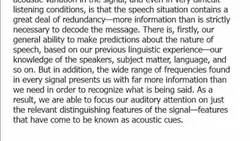
GMAT Reading Comprehension Passage Explanations 
This course provides an in-depth explanation of GMAT Reading Comprehension Passages. You will learn how to analyze and answer questions related to a variety of topics, such as Speech Recognition, Alvarez Hypothesis, Demotic Greek and Katharevousa, Environmental Regulations, Colonial Feminism, and The Arctic Curlew. You will gain the skills to understand and answer questions related to these topics. ▼
ADVERTISEMENT
Course Feature
![]() Cost:
Cost:
Free
![]() Provider:
Provider:
Youtube
![]() Certificate:
Certificate:
Paid Certification
![]() Language:
Language:
English
![]() Start Date:
Start Date:
On-Demand
Course Overview
❗The content presented here is sourced directly from Youtube platform. For comprehensive course details, including enrollment information, simply click on the 'Go to class' link on our website.
Updated in [May 25th, 2023]
This course provides an overview of GMAT Reading Comprehension Passages. Students will gain an understanding of the various topics covered in the passages, such as Speech Recognition, Alvarez Hypothesis, Demotic Greek and Katharevousa, Environmental Regulations, Colonial Feminism, and The Arctic Curlew. Through this course, students will be able to gain an understanding of the questions associated with each passage and how to answer them correctly. Additionally, students will be able to gain an understanding of the various strategies and techniques used to answer GMAT Reading Comprehension questions.
[Applications]
After completing this course, students can apply the knowledge they have gained to answer GMAT Reading Comprehension questions more accurately and efficiently. They can also use the strategies and techniques learned in this course to improve their overall reading comprehension skills. Additionally, students can use the course material to review and practice for the GMAT Reading Comprehension section.
[Career Paths]
1. Business Analyst: Business Analysts are responsible for analyzing data and developing strategies to help businesses make informed decisions. They use their knowledge of market trends, customer behavior, and industry regulations to identify opportunities for improvement and growth. Business Analysts are in high demand as companies look to maximize their efficiency and profitability.
2. Data Scientist: Data Scientists are responsible for collecting, analyzing, and interpreting large amounts of data. They use their expertise in mathematics, statistics, and computer science to develop models and algorithms that can be used to make predictions and uncover insights. Data Scientists are in high demand as companies look to leverage data to gain a competitive edge.
3. Market Research Analyst: Market Research Analysts are responsible for gathering and analyzing data to understand consumer behavior and market trends. They use their knowledge of market research techniques to develop surveys, focus groups, and other methods to collect data. Market Research Analysts are in high demand as companies look to understand their customers and develop effective marketing strategies.
4. Management Consultant: Management Consultants are responsible for providing advice and guidance to organizations on how to improve their operations. They use their expertise in business strategy, operations, and finance to develop solutions that can help organizations become more efficient and profitable. Management Consultants are in high demand as companies look to optimize their operations and stay competitive.
[Education Paths]
1. Business Administration: Business Administration degrees provide students with the skills and knowledge necessary to manage and lead organizations. This degree path is becoming increasingly popular as businesses become more complex and competitive. Students will learn about finance, accounting, marketing, operations, and human resources, as well as the legal and ethical aspects of business. With a degree in Business Administration, graduates can pursue a career in management, finance, or consulting.
2. Economics: Economics degrees provide students with the skills and knowledge necessary to understand the economic forces that shape our world. This degree path is becoming increasingly popular as the global economy becomes more interconnected. Students will learn about macroeconomics, microeconomics, international economics, and public policy. With a degree in Economics, graduates can pursue a career in finance, banking, consulting, or government.
3. Accounting: Accounting degrees provide students with the skills and knowledge necessary to understand and analyze financial information. This degree path is becoming increasingly popular as businesses become more complex and competitive. Students will learn about financial accounting, managerial accounting, auditing, taxation, and financial statement analysis. With a degree in Accounting, graduates can pursue a career in public accounting, corporate accounting, or financial analysis.
4. Data Science: Data Science degrees provide students with the skills and knowledge necessary to analyze and interpret large datasets. This degree path is becoming increasingly popular as businesses become more reliant on data-driven decision making. Students will learn about data mining, machine learning, predictive analytics, and data visualization. With a degree in Data Science, graduates can pursue a career in data analysis, data engineering, or data science.
Course Provider

Provider Youtube's Stats at AZClass
Discussion and Reviews
0.0 (Based on 0 reviews)
Explore Similar Online Courses

Accounting for Death in War: Separating Fact from Fiction

Leading Oneself with Self-Knowledge

Python for Informatics: Exploring Information

Social Network Analysis

Introduction to Systematic Review and Meta-Analysis

The Analytics Edge

DCO042 - Python For Informatics

Causal Diagrams: Draw Your Assumptions Before Your Conclusions

Whole genome sequencing of bacterial genomes - tools and applications

Ultimate GMAT Essay - Ace the Essay in 1 week

TIME AND WORK: A MASTERCLASS GMAT GRE SAT CAT IBPS


Start your review of GMAT Reading Comprehension Passage Explanations